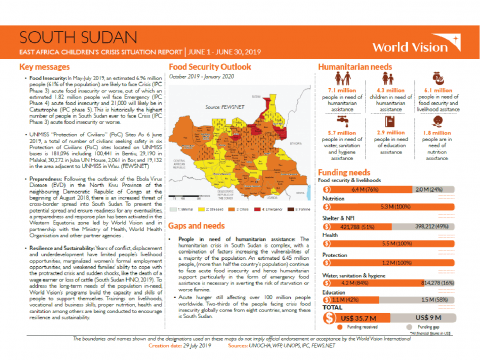South Sudan - June 2019 Situation Report
Download
- Food Insecurity: In May-July 2019, an estimated 6.96 million people (61% of the population) are likely to face Crisis (IPC Phase 3) acute food insecurity or worse, out of which an estimated 1.82 million people will face Emergency (IPC Phase 4) acute food insecurity and 21,000 will likely be in Catastrophe (IPC phase 5). This is historically the highest number of people in South Sudan ever to face Crisis (IPC Phase 3) acute food insecurity or worse.
- UNMISS “Protection of Civilians” (PoC) Sites As 6 June 2019, a total of number of civilians seeking safety in six Protection of Civilians (PoC) sites located on UNMISS bases is 181,096 including 100,441 in Bentiu, 29,190 in Malakal, 30,272 in Juba UN House, 2,061 in Bor, and 19,132 in the area adjacent to UNMISS in Wau.
- Preparedness: Following the outbreak of the Ebola Virus Disease (EVD) in the North Kivu Province of the neighbouring Democratic Republic of Congo at the beginning of August 2018, there is an increased threat of cross border spread into South Sudan. To prevent the potential spread and ensure readiness for any eventualities, a preparedness and response plan has been activated in the Western Equatoria zone led by World Vision and in partnership with the Ministry of Health, World Health Organisation and other partner agencies.
- Resilience and Sustainability: Years of conflict, displacement and underdevelopment have limited people’s livelihood opportunities, marginalized women’s formal employment opportunities, and weakened families’ ability to cope with the protracted crisis and sudden shocks, like the death of a wage earner or loss of cattle (South Sudan HNO, 2019). To address the long-term needs of the population in-need, World Vision’s programmes build the capacity and skills of people to support themselves. Trainings on livelihoods, vocational and business skills, proper nutrition, health and sanitation among others are being conducted to encourage resilience and sustainability.
Share



